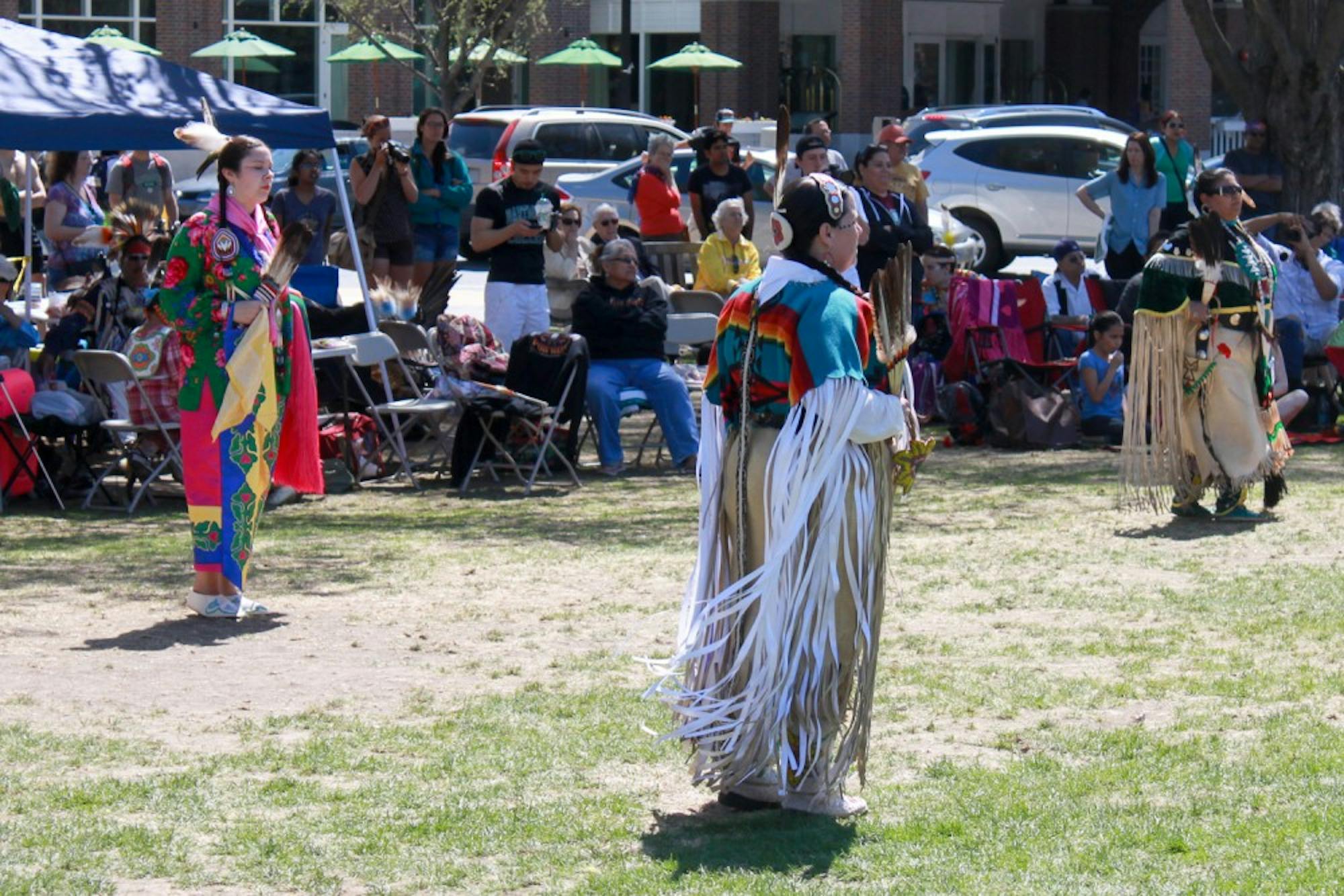For video footage, click here.
The steady pulse of drums beat across campus as the festivities of the 42nd annual Dartmouth powwow concluded this weekend. The gathering drew more than 500 spectators and participants on the Green on Sunday, with a slightly lower attendance at Saturday’s events, held in Leede Arena due to rain.
A student committee consisting of 11 members, headed by co-presidents Zach Cooper ’17 and Emily Harwell ’16, plans and runs the event, which is one of the largest powwows in the Northeast region.
In addition to bringing in vendors, dancers and musicians from across the country, the committee also chooses people to honor each year in a ceremony. This year’s honorees included Michael Choukas Jr. ’51, selected for his deep ties to the Native American Program at Dartmouth, and Russell Cooper Sr., Zach Cooper’s grandfather.
“We do this as a celebration of our culture as well as a gathering to bring our families together,” Harwell said.
Traditionally, Harwell added, not every tribe holds powwows. Native American students at Dartmouth come from various tribes, including the Cherokee, Hopi, Chickasaw, Seminole, Navajo and Creek Indians, among others. This year, Harwell estimated that representatives from 30 tribes from as far away as California and Canada attended the event.
Kohar Avakian ’17, one of eight freshmen on the powwow committee and a member of the Nipmuc Nation, said she felt honored to help plan such a well-known, respected event. The committee traditionally consists of freshmen in order to ensure the event’s continuation, Harwell said.
In 1971, former College President John Kemeny founded the NAP. The first powwow was held in 1973, first near Storrs Pond and then at the BEMA. As it grew larger, organizers moved the powwow to the Green.
“It really is a place to reconnect with people, friends and family, and it has a really good energy and is just a good environment to be in,” Avakian said.
Avakian said that the event acknowledges that the College was built on Abenaki land.
“With the history of Dartmouth and the United States it’s important that we keep celebrating our culture because without organizations and events like this we probably wouldn’t survive,” Avakian said.
Harwell said that the committee utilizes family connections in their search for head staff, which leads dances and organizes dance competitions. In addition, word of mouth within the Native community attracts dancers and vendors.
Avakian said that the planning process, which begins in the fall, was arduous. Avakian helped choose the head staff which consisted of the emcee, Don Barnaby, head man Annawon Weeden, head woman Christina Goodson ’14 and the arena director Roger White Eyes.
Dance and song are central to any powwow, Harwell said.
The Bearskin Singers from Wenebago, Nebraska, including Keenan Bearskin ’17, served as the host drum this year with support from three other drum groups, who provide all the music for the dances.
Harwell said that there were approximately 20 vendors, including students, selling items including jewelry and moccasins. In addition, the committee sells T-shirts and fry bread, the proceeds of which support the event. The event, which costs around $35,000, receives support from the President’s Office, the Special Program and Events Committee and NAP. Vendors also pay a fee.
Anemone Mars, a member of Narragansett Tribe from Rhode Island, attended the powwow for the third time as a jewelry vendor this year. Mars said that this year’s business was much slower than previous years, noting that more people were browsing, not buying. Mars also said that she was somewhat disappointed to see that some vendors were selling more commercialized ware.
“I’m finding at Ivy League events that this element is infiltrating them, and I think that they can and need to have a higher standard of artistry,” Mars said.
Mars said that she values the artistry and the educational elements of her work, specifically being able to inform buyers about the process and the history of the work.
Rhonda Anderson, a silversmith from Massachusetts, also sold jewelry this weekend with her 10-year-old daughter Nayana. Anderson said she heard of the event through friends. As a Native Alaskan, Anderson said, powwows are not part of her culture, but she believes it is important to immerse herself and her daughter in the culture because they currently live in the Northeast.
“It helps build a good foundation for my daughter of a cultural identity of being indigenous and teaches her a responsibility to create and also how to make money for herself,” Anderson said.
Attendance on both Saturday and Sunday was greater than organizers expected, Avakian said, adding that organizers were presently surprised by the turnout.
“You can’t cross campus without crossing the Green, and you can’t hear the music and see the dancers and not want to stop and watch,” Avakian said.
Harwell said she was surprised by the large number of non-Native attendees, not because she believed they were “afraid or uninterested,” but because they may have lacked knowledge of the tradition. For interested students, Harwell said, the powwow can serve as a learning experience.
Abena Frempong ’17, who attended the powwow, said the event took her out of “the Dartmouth bubble.”
Others said they appreciated the cultural and spiritual aspects of the weekend’s events. Apuayah Peters, of the Mashpee Wampanoag Tribe, said that she enjoys the organized yet low-pressure environment of the Dartmouth powwow. Peters competed in the women’s jingle dance and said that the during the powwow season, spring and summer, she attends one every weekend.
“I don’t have a religion, but the spirit here is kind of my religion,” Peters said. “When I dance, that’s when I pray.”
The article has been revised to reflect the followingcorrection:
Correctionappended: May 13, 2014.
The Bearskin Singers are from Wenebago, Nebraska, not Pine Ridge, South Dakota, committee co-presidentEmily Harwell ’16 said.




